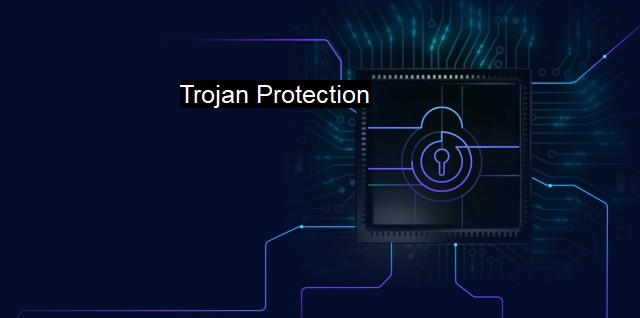What is Trojan Protection?
Protecting Against Trojan Malware: Essential Precautions to Secure Your Private Networks and Data
Trojan protection refers to security measures that are established to prevent, detect, and remove Trojan horse viruses from a computer system or network. It's essential to the system's ongoing security within the realms of cyber security and antivirus.Trojan horses, or simply "Trojans," are a type of malicious program or code that, much like the ancient Greek story it's named after, disguises itself as a harmless entity to trick users into installing it onto their systems. once installed, they can cause significant damage, ranging from stealing sensitive data to enabling cyber criminals remote access to the system.
Unlike common myth, Trojans do not replicate themselves like worms or viruses but rely on the unsuspecting user's misjudgment or unawareness to get executed. This 'social engineering' aspect makes Trojans a severe threat for institutions, enterprises and individuals alike as it exploits something which isn't easy to control – human behavior.
Thus, an effective Trojan protection strategy is more complex and needs careful planning and execution. It involves a comprehensive combination of education, safe browsing and downloading practices, regular system and software updates, data backup, use of reputable security products and tools, and healthy skepticism in the digital world.
Education, especially about cybersecurity, is perhaps the first and most crucial line of defense. Knowledge about various online threats, deceptive practices utilized by cybercriminals, key identifiers of phishing scams and misleading email messages can significantly reduce the risk of a Trojan infection.
The most likely method for the introduction of a Trojan is through downloads, often bundled within legitimate-looking software, files, or computer applications. Therefore, safe downloading practices are an integral part of Trojan protection. Users should only download content from trustworthy sources and avoid pop-ups, suspicious links, and unsolicited email attachments.
Likewise, protective software is an essential tool for enhancing a system's security. This includes antivirus and antimalware programs, which often come with an integrated, specialized Trojan remover. The antivirus scans the system to detect unknown threats and analyzes different files to find a possible Trojan horse candidate. Once a potential threat is detected, the antivirus either quarantains or removes it to neutralise it.
But not even the most renowned antivirus applications can evade every Trojan because their game is deception. They're continuously being updated and made more sophisticated by the attackers, and their detection requires the software to be updated regularly. Hence, keeping the OS, browser and all applications up-to-date is an undervalued yet fundamental part of Trojan protection. Using a good firewall, too, can help protect your system by controlling network traffic and preventing unauthorised access to your system.
A significant part of Trojan protection involves fighting the effects of a successful Trojan attack. Regularly backed-up systems can encounter a Trojan havoc and come back unscathed or with minimum loss of data. This is because, regardless of the size of devastation, the user can always revert to the thoroughly clean version from the last backup.
Lastly, Trojan protection, just like cybersecurity, generally necessitates a healthy skepticism whilst online. Users should be wary of offers that seem too good to be true, generic solicitations for charity, or unsolicited contact from "official" institutes asking for private information.
In sum, the essence of Trojan protection in cybersecurity lies not only in its technical aspects but also in the ongoing human efforts. Our virtual world brings with it real-life risks comparable to what the city of Troy faced in ancient mythological times. Preventing the invasion of Trojans requires constant vigilance on our part, backed strongly by the right tools and practices at hand.

Trojan Protection FAQs
What is a Trojan and why do I need protection against it?
A Trojan is a type of malicious software that disguises itself as a legitimate program to trick users into downloading it. Once installed, it can allow an attacker to gain unauthorized access to your computer and steal sensitive information. Protection against Trojans is essential to keep your personal data safe.What are some signs that my computer may be infected with a Trojan?
Some signs that your computer may be infected with a Trojan include slow performance, pop-up ads, unexpected program crashes, and changes to your homepage or search engine. It's important to have antivirus software installed that can detect and remove Trojans before they cause damage.Can antivirus software completely protect me from Trojans?
While antivirus software can help protect against Trojans, no solution is 100% foolproof. Attackers are constantly developing new methods to evade detection, so it's important to stay vigilant and take other steps to protect your computer, such as keeping software up to date and avoiding suspicious websites and downloads.How can I ensure that my Trojan protection is working effectively?
To ensure that your Trojan protection is working effectively, make sure that your antivirus software is up to date and set to scan your computer regularly. You should also be wary of suspicious emails and websites, and avoid downloading files or clicking on links from unknown sources. Regularly backing up your data can also help protect against Trojan attacks.| | A | | | B | | | C | | | D | | | E | | | F | | | G | | | H | | | I | | | J | | | K | | | L | | | M | |
| | N | | | O | | | P | | | Q | | | R | | | S | | | T | | | U | | | V | | | W | | | X | | | Y | | | Z | |
| | 1 | | | 2 | | | 3 | | | 4 | | | 7 | | | 8 | | |||||||